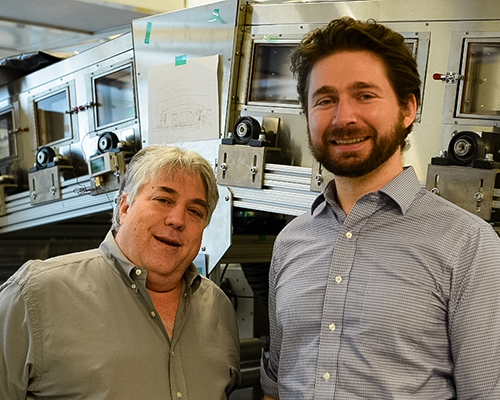Trade commissioners help Vancouver company bring innovations from laboratory to market
How do you turn a great idea into a market‑leading solution? For Vancouver’s Ionomr Innovations Inc., a large part of the answer is to work hand‑in‑hand with the Canadian Trade Commissioner Service (TCS) in strategic markets around the world, beginning with its Pacific regional office.
Ionomr was co‑founded in 2017 by Ben Britton, now the company’s chief strategy officer, and Steven Holdcroft, Ionomr’s scientific advisor, based on technology they first developed at Simon Fraser University. These were ion‑exchange polymers that are made into membranes used in electrolyzers that produce hydrogen as well as in hydrogen fuel cells. They are durable, efficient, cost-effective and especially green, free of the toxic legacy chemicals often used by hydrogen technologies.
 (L‑R) Bill Haberlin, CEO, and Benjamin Britton, chief strategy officer, of Ionomr Innovations Inc.
(L‑R) Bill Haberlin, CEO, and Benjamin Britton, chief strategy officer, of Ionomr Innovations Inc.
The firm is now part of the movement to accelerate the adoption of hydrogen as a clean fuel source, with worldwide demand increasing. The global market for hydrogen fuel is estimated to reach more than US$2.5 trillion per year by 2050, when it is expected to provide about one quarter of global energy demand. “That’s on the conservative side. In China alone the target is $1 trillion by 2030,”
Britton says.
Innovative companies such as Ionomr are positioned to play key roles as ambassadors of Canadian know‑how in the development of hydrogen technologies in this new economy.
“What Ionomr is bringing to the marketplace is a next‑generation material to enable widespread adoption of hydrogen—at scale and at cost—in the next decade to two decades,”
explains Bill Haberlin, the company’s CEO, noting that the technology is critical for the decarbonization of the planet and the generation of revenues and jobs in Canada. “Our materials are game‑changers.”
Ionomr has worked with the TCS since its beginnings, participating in the early days in the Canadian Technology Accelerator (CTA), where Britton learned to “frame my message to investors”
in order to commercialize the technology. Ionomr is now in contact with trade commissioners in more than 25 international markets under the guidance of Serena Ko, the company’s primary contact in the TCS Pacific regional office.
 Serena Ko, trade commissioner at the TCS Pacific regional office
Serena Ko, trade commissioner at the TCS Pacific regional office
It helps that Ko has a good understanding of the full scope of offerings of the TCS and its partners, she knows how to succeed in different markets around the world and has a full picture of where the company wants to go, Haberlin points out.
“Serena is absolutely fundamental to getting the word out to her colleagues around the globe about why our material is unique,”
he comments. “As any startup company trying to change the world, we don’t have infinite resources. We can use the TCS to open doors and make introductions to places where the doors don’t open easily. We look at them as an extension of our organization.”
Ko, who covers hydrogen fuel cells and smart‑grid technologies as part of the Pacific regional office clean‑technology team, calls Ionomr a “super user”
of the TCS, working closely with her to achieve their international business development targets.
The cleantech trade commissioners whom she deals with in the field are “super networkers and super knowledgeable,” Ko says, offering a “great roster of qualified contacts” for the company to check out on its client journey. “It’s their job to really understand both the industry and the local opportunities that would be helpful for Canadian clients.”
The company has had significant interactions with trade commissioners and established a foothold in a number of markets in Europe, Asia and beyond. It currently licenses its technology to companies involved in hydrogen and is considering developing its own materials production facilities over the next five years.
Haberlin and Britton are impressed with the energy and initiative shown by the TCS team abroad, especially with the COVID‑19 pandemic travel restrictions hampering company travel. In Korea, trade commissioner Hyon Ju Yi, who covers clean‑technology, provided “over‑the‑top”
service, says Haberlin, managing the Canada Pavilion that Ionomr participated in at twotrade shows back‑to‑back.
“She ran the events for us,”
adds Britton. Yi arranged virtual meetings with key companies in Korea’s hydrogen and fuel‑cell industry and facilitated discussions that lead to Ionomr signing two non‑disclosure agreements.
In Shanghai, clean‑technology trade commissioner Claire Zhang “was instrumental in setting up key meetings for us at a fuel cell conference, since we could not be there,”
Haberlin says. “As part of the Canada Pavilion, she made connections with key companies in the marketplace, facilitated conversations and even provided some translation services when we got stuck.”
He adds Zhang has been working to make further connections for Ionomr “now that she understands what our materials are capable of and sees the level of interest from the participants she brought to the meetings.”
Zhang notes that as a result of Canada’s presence there, Ionomr connected with eight qualified leads, signed one non-disclosure agreement (with another three possible) and had two requests for distributor contracts.
She mentions the TCS acts as “the eyes, ears and nose on the ground for our clients,”
providing “wholistic”
service, facilitating communications with foreign clients and advising companies of potential risks. She says Ionomr’s leadership in the “clean‑and‑green”
hydrogen field gives it high potential for success in China.
The company participated in the CTA for Climatetech last autumn to gain greater market exposure and new investors as well as partners in the U.S. The virtual program included matchmaking sessions with mentors and sector experts, deep‑dive sessions with clean-tech trade commissioners in New York, Boston, Denver and San Francisco, and opportunities to pitch potential partners and investors.
Ionomr currently has 30 employees and plans to expand its workforce over the next year, Haberlin says. “Everyone at the company is passionate about providing the underlying materials necessary to drive the energy revolution that’s ahead of us.”
Its goal is to become the “dominant provider of materials necessary to drive electrochemical solutions around the globe,”
which will give Canada a leadership position in the hydrogen economy and contribute to carbon neutrality, he adds. “It’s a phenomenal opportunity to take advantage of.”
Subscribe to: CanadExport
- Date Modified: